What Does a Blog Editor Do and Should You Hire One?

Over the last year, I've been writing a handful of "profile" articles on different roles within a content marketing team, company, or organization. I've dug into what they do, what role they play, and how they can be valuable to you. These have included:
- Blog Managers
- Content Writers
- Fact-Checkers
- Team Overviews
One role I haven't yet touched on is that of the blog editor. Editors are one of the most critical members of your content team, but they're also by far the most varied. The job duties of an editor for my team will differ from those of another group. A third team might have a completely different set of responsibilities from those.
What do editors do? Do you need one, or can you make do without one?
Let's dig in!
What Do Blog Editors Do?
First up, let's talk about the scope of duties for an editor.
Editors for blogs, websites, and online magazines can have what I view as three different sets of duties. There are "top-level" duties, there are "mid-level" duties, and there are "low-level" duties. The level is more of a computer term than a scale of importance, though. Low-level for a computer means operating at the processor/assembly level rather than with code or a GUI. Low-level processes are still critical and not to be downplayed.
What kinds of duties are included in each of these levels? I'll go over them in greater detail in a moment, but as a rough summary:
- High-level: Content ideation, scheduling, publishing, and promotion.
- Mid-level: Link monitoring, SEO, comment engagement, analysis, and reporting.
- Low-level: Spelling, grammar, fact-checking, and verification.
These responsibilities are examples of the all-encompassing workload that editors around the world are faced with every day.
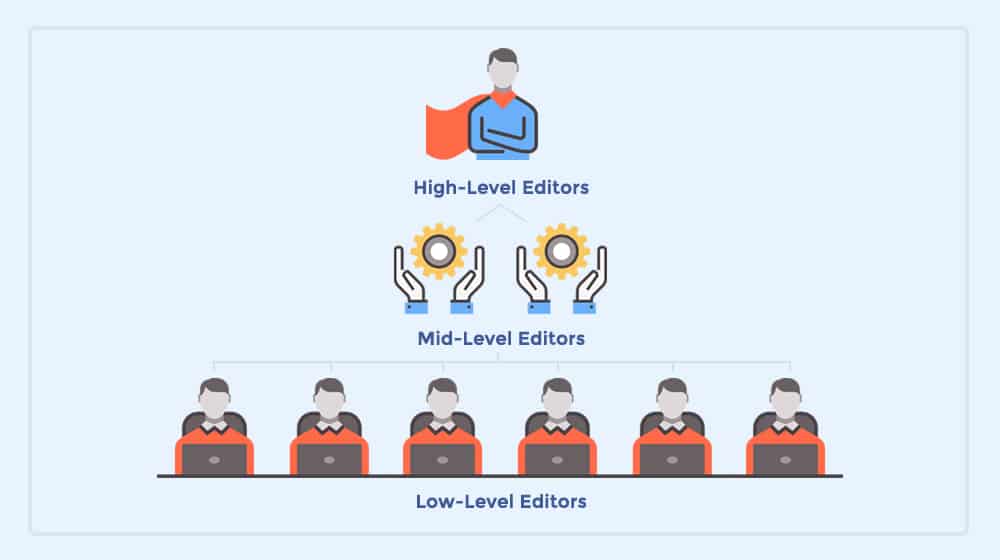
One thing you might notice is that these are three different jobs all rolled into one.
1. High-level editor duties tend to encompass upper-level management and overlap a lot with the blog manager position. In small companies and blogs, the owner or the head content marketer often does this work, not usually an editor.
2. For the middle level, you're looking at managing editor or senior editor duties. To put it in newspaper or magazine terms, this is the editor responsible for page layout, features, and overall themes for the entire website. On the web, those duties translate into technical responsibilities that affect the general direction and flow of the site but are still technical. They generally focus on tasks that need individual attention rather than strategic vision.
3. At the lower level roles, they are more what you would expect out of a junior editor or a technical editor position. They do the actual editing of the content, including the basic spelling and grammar checks, minor edits and revisions for style and substance, fact-checking, and technical verification for things like "making sure links work."
And, of course, the company's scope means that there might be 1-3 high-level editors, 3-5 mid-level editors, and a legion of low-level editors in a large organization. A site like Entrepreneur.com has one overall high-level editor (the Editor-in-Chief), several mid-level editors that they call directors of content. Then they have individual editors for sections like contributed content, social media, and so forth.

Forbes is similar; they have an editor-in-chief, they have section editors, and then they have technical editors for sub-sections. In a large organization like Forbes, you have even higher-level positions like Chief Content Officer and more layers and defined duties along the hierarchy.
What you need as a small business is not what Forbes needs as a globally recognized publication.
High-Level Editors
Also known as managing editors, editors-in-chief, and blog managers, high-level editors guide the strategic vision of the entire blog. They might be marketers as well, or they might work with marketers.
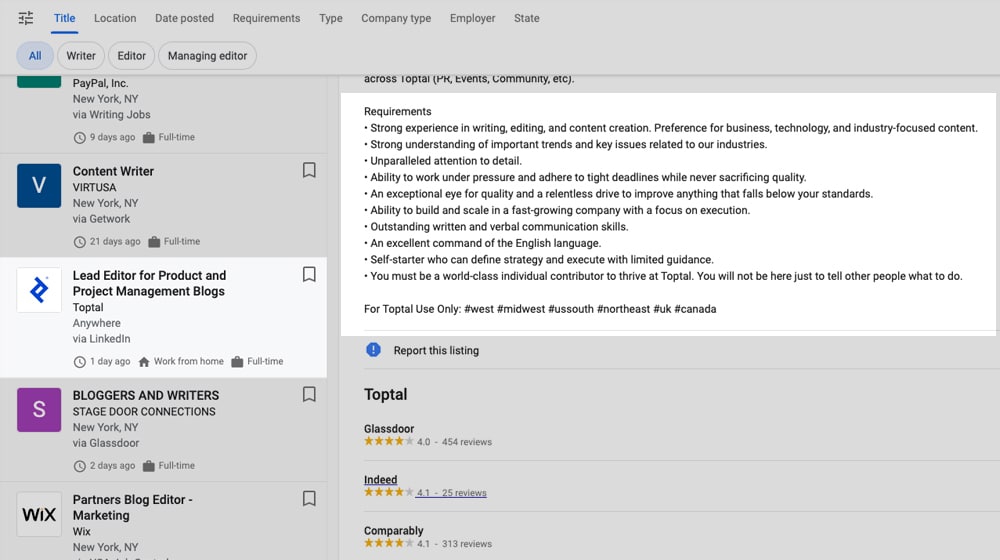
Their duties include things like:
- Develop a content plan. What kinds of topics are acceptable and what aren't? In what order should they be published? What should be featured or pushed?
- Perform the research and topic ideation. While some publications work from a ground-up technique where the writer pitches and the editor approves, most smaller blogs have to work from the top down. They identify good topics and developing unique angles within them to assign to writers.
- Any blog with a managing editor typically requires their final approval before a piece of content goes live on the site to ensure everything is controlled and within scope.
High-level editors are strategists, marketers, and visionaries. They're the people who guide the overall path of the blog, and consequently, the company. In small businesses, this may be the owner or someone in a board-level position. These responsibilities are similar to my work, both for my site and for my clients.
Do you need a high-level editor?
Does your blog need a high-level editor?
Often, this is a role that site owners cling to. They want this level of control, even when it means sacrificing time that could be better spent elsewhere. There's nothing inherently wrong with wanting to maintain this kind of control, of course. It just means that when you reach the point where you need to hire an editor-in-chief, you're going to need to find someone you can work well with.
Mid-Level Editors
Mid-level editors handle a lot of the gritty details that are too narrow in scope for the managing editor but are too high-level for the low-level editors. They are one of the last roles to be filled in a structure because a managing editor and a technical editor can cover all bases before that point. It's only once the scope of a blog or publication grows beyond what those two can carry that this third position opens up.
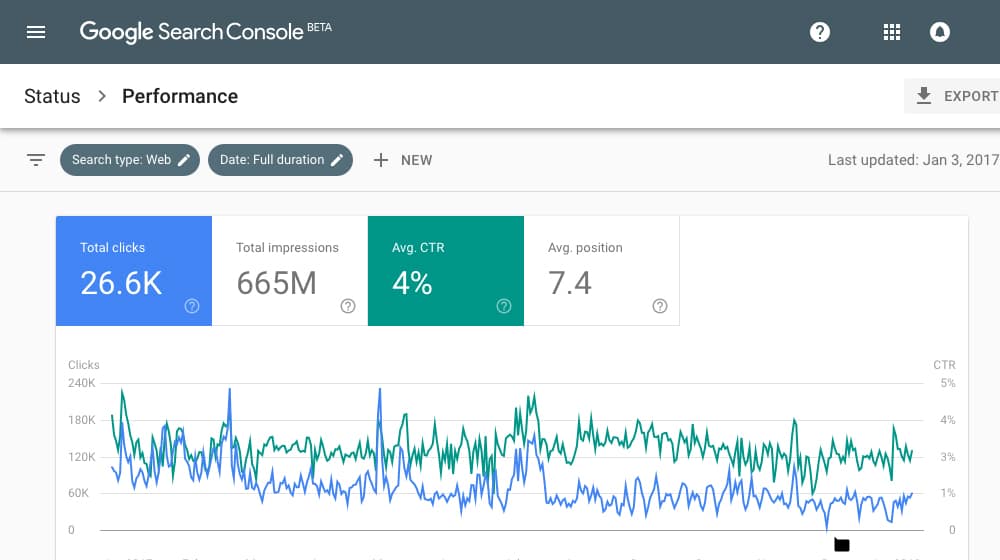
Their duties may include things such as:
- Link monitoring. This person has to monitor links across the site to make sure they're all still resolving, and they update links where they are broken. Links to smaller or spammy sites are stripped of authority. They load and review each of the links in articles and ensure that those external resources are correctly flagged according to SEO best practices. This responsibility could also be a top-level editor job.
- SEO in general – at least below the top strategic level – tends to fall here. This person's responsibility is to use proper keywords, internal links, formatting, headings, metadata, and all the stuff that gets written up in on-page SEO guides. This task could also be a top-level editor's responsibility.
- Monitoring content for new blog comments, making sure they aren't spammy, and responding to those comments is a duty for this editor level. It may also be a top-level duty, or it can be left to the writer, depending on the publication's scope.
- Analytics and reporting. How well does the content perform? Identifying this can be a top-level editor duty, or it can be a mid-level editor duty, or you can offload it specifically to analysts.
- Monitoring and fixing site issues. A blog that has content that Google doesn't index might need this editor to identify the problem and fix it, for example. Again, maybe a duty for a higher-level editor, or maybe for a non-editor site manager role.
Generally, the mid-level editor position opens up when the top-level editors get so swamped with work that they need someone else to handle the most straightforward stuff on their plate. They might promote a low-level editor to the role, or share duties, or hire someone else. You might also notice that some of these duties can be filled by other roles entirely, like a data analyst or an SEO professional, which is typical for some blogs.
As I said, it's a very flexible and dynamic role, and every company and publication tends to have its unique structure and division of labor.
Do you need a mid-level editor?
Again, someone needs to do the work, but some of the jobs might not be relevant. A small blog doesn't need a dedicated person to watch analytics and generate reports. Their editor-in-chief or owner can look at their Google Analytics reports and get everything they need to shape their overall content strategy and decision-making processes.
When that point comes, then yes, you need someone in this role. Until then, you can do fine without a dedicated middle editor.
Low-Level Editors
Low-level editors (sometimes called technical editors but often just editors) are the bread and butter of ensuring that your content shines. These are the buffer between your writers and the world, making sure that your content is the best it possibly can be.
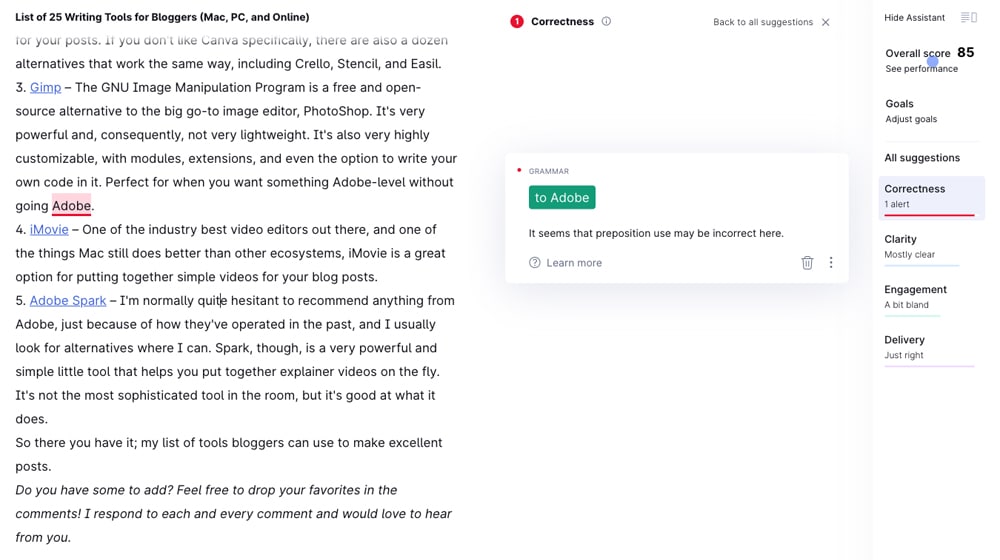
What do they do?
- Spelling checks. Even the world's best writer occasionally makes mistakes, and it's an honest mistake if a writer doesn't notice an error when they're done with an article. There's a reason there are all kinds of tricks, from using software to reading your content aloud to check for errors; they can be insidious and difficult to catch. An editor can spot them where the writer might miss them. It's beneficial to have a second set of eyes on every article. Spelling and grammar errors aren't good for rankings or user experience.
- Grammar checks. The same as for spelling. The editor needs a deep working knowledge of grammar in your language, how it works, and how it works in the style your site is going for. Formal grammar and casual grammar are different, after all. Automated tools like Grammarly cannot do this on their own; they make too many mistakes. Tools are good to have, but they cannot replace human knowledge.
- Fact checks. Fact-checking can be important for certain kinds of content. If a writer turns in a step-by-step tutorial for a process, but those steps don't work, it's up to the editor to catch it before it is published and your audience finds out the hard way. The same goes for facts versus misinformation or opinion. Your editor needs to keep the opinions and views of the company in mind. Publishing inaccurate content is terrible for your rankings, and you want to make sure that the words published on your domain are factual and backed up with reputable sources.
- Making a post shine, tightening it up, and improving it in subtle but important ways, is all part of the day's work for a good editor.
- Style and voice edits. Your company might have a house style, a voice, or a tone that all content published needs to adhere to for continuity's sake. The editor is responsible for ensuring this continuity.
These responsibilities are a lot of work, and that work is amplified depending on your publishing volume. What sets the low-level editor apart from the editor-in-chief is that they work directly with individual writing pieces. The editor is responsible for taking an article from a writer, polishing it up, and sending it up the chain to be published. The managing editor is responsible for guiding the direction of the publication but might not regularly take a look at the content before publishing.
Do you need a low-level editor?
Yes, without question.
If it's a small blog you own, operate, and write for, ask a friend to read over your articles until you've grown, or pay an editor per word to edit for you. If you're a small business, you might consider hiring an editor. It's money well-spent.
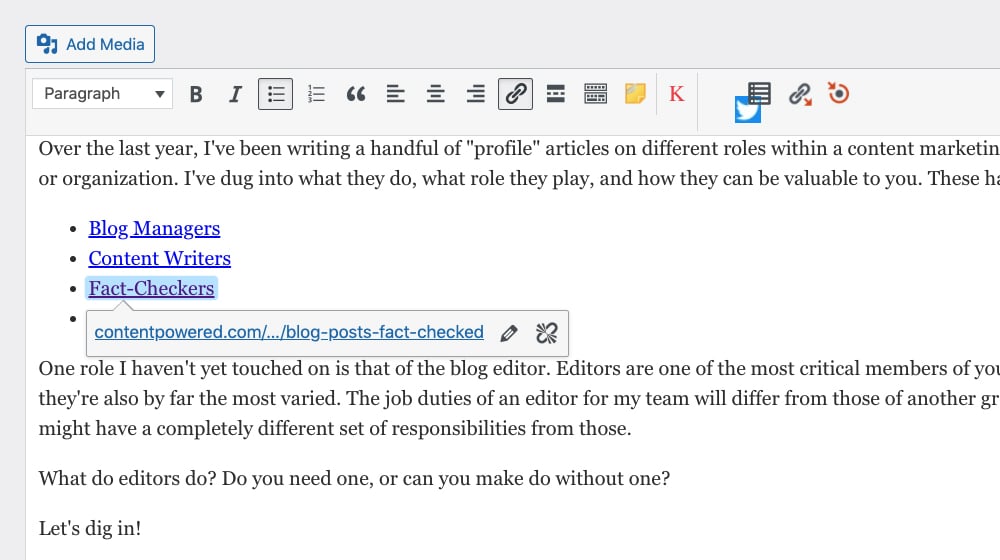
I would even venture to say that the technical editor role is more important than any other editor role. You can pass off every other editorial duty to an analyst, a writer, a strategist, a marketer, the owner, or whoever. The technical editing? That needs to be done by an editor.
Should You Hire an Editor?
I firmly believe that you need an editor for your blog. I've seen far too many blogs and publications – even otherwise large and professional organizations – with sub-par blogs. You would not believe the number of companies I've looked at with blogs that are low-quality, all over the place in tone and voice, with broken links, grammar errors, and even content that just never got indexed.
As often as I discuss the necessity of having someone perform topic research and strategy, it's almost equally important to have all the technical writing and editing details down before then. Trust me, articles that haven't been edited will not perform as well as articles that a dedicated editor carefully edits.
So, there's your answer: yes, you should hire an editor. Hire as many as you need to divide up the work you need to ensure that it's done well. Most smaller to medium-sized blogs can go a long way with a single blog editor.
Somebody needs to be doing that work! If posts are published without a couple of rounds of edits, that's a problem for your traffic, rankings, user experience, and your overall content strategy.




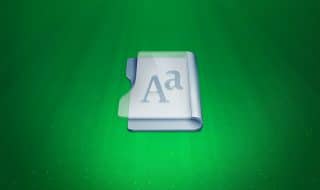


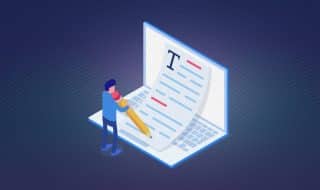


May 05, 2022
How early on should we hire a blog editor? We started the blog only a few months ago and I'm now contemplating hiring a blog editor. I'm only hesitating about our budget for this. I'm not sure if there's something else we should prioritize.
May 05, 2022
Hi Kelly!
You could try requesting that your writer does a Grammarly check before submitting their article.
That could improve the quality of your final blog posts without hiring a dedicated editor.
It will look pretty bad to visitors and search engines if your article is fluffy, off-topic, rambles on, or has grammar issues. It's best to have somebody reading every article from start to finish and polishing them, whether you or somebody else.
It's well worth the investment to have a second set of eyes on every new article before publication. One lousy post could tank your entire site's performance if it has low-quality or spammy links, plagiarized content, etc.